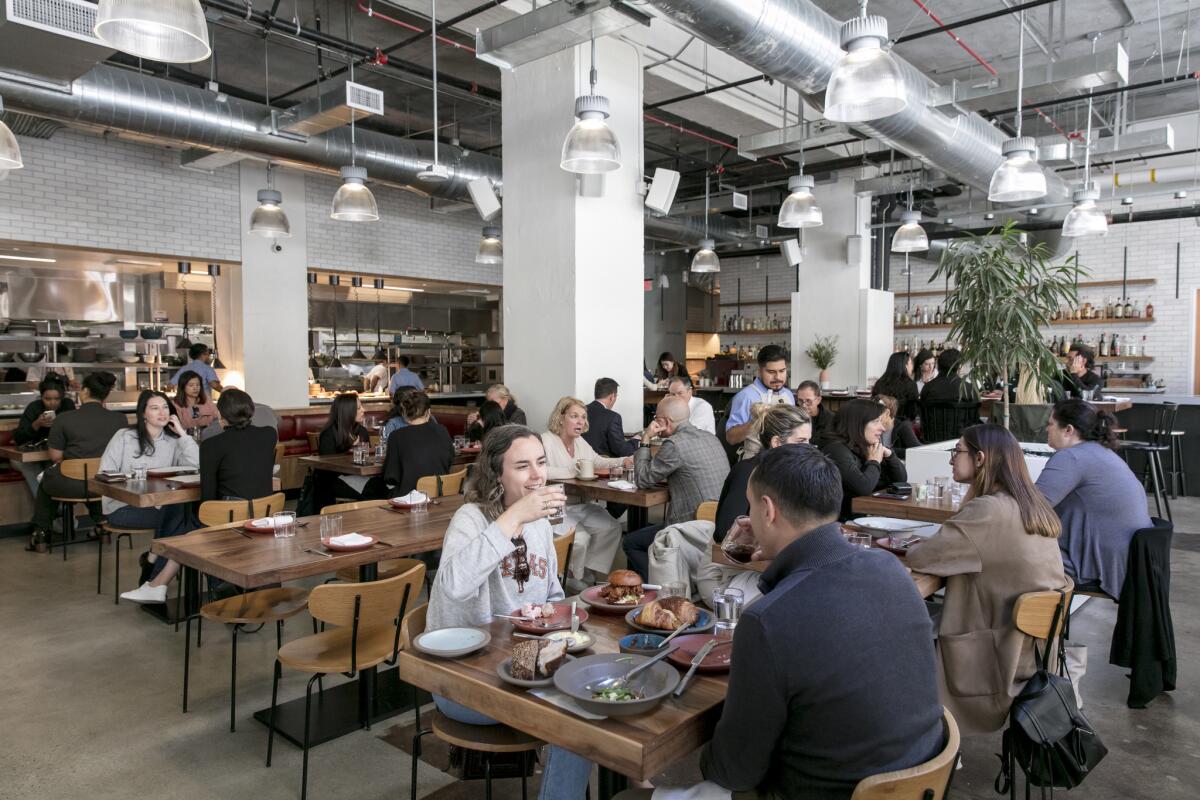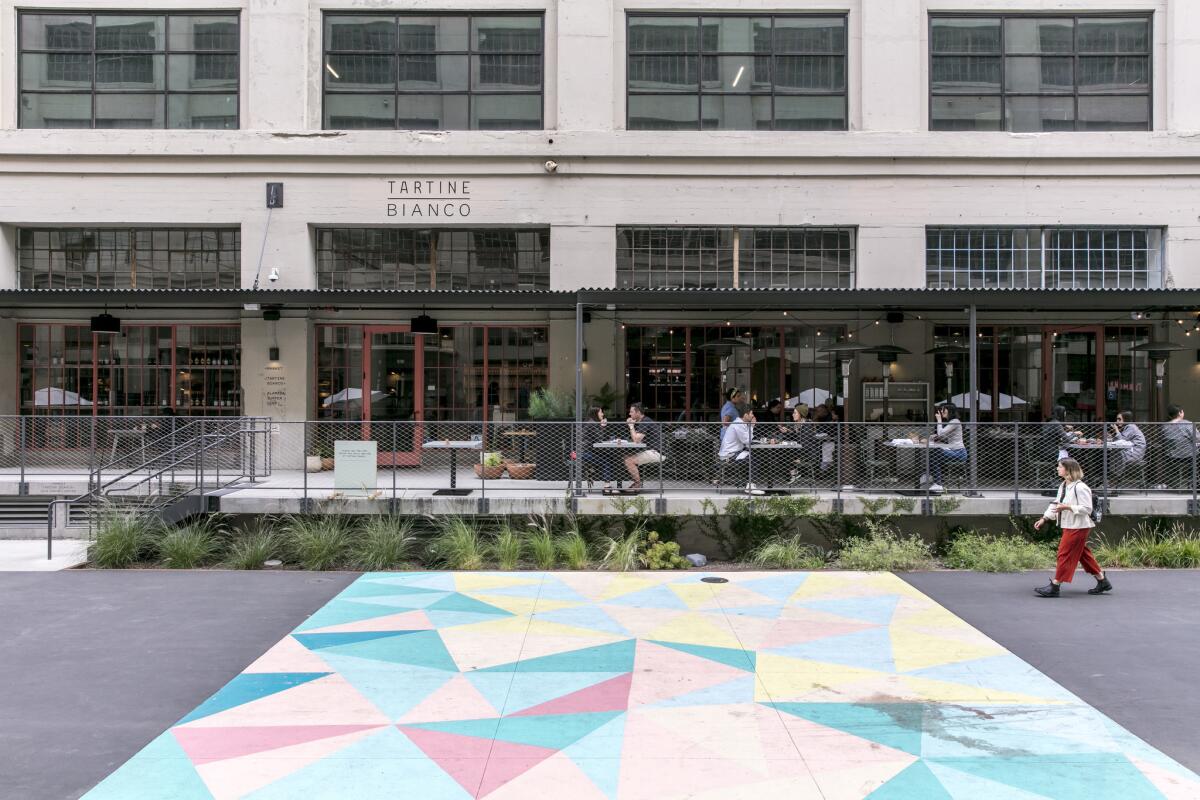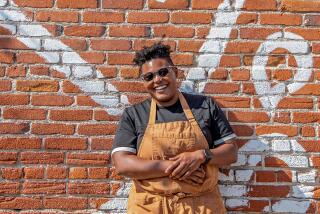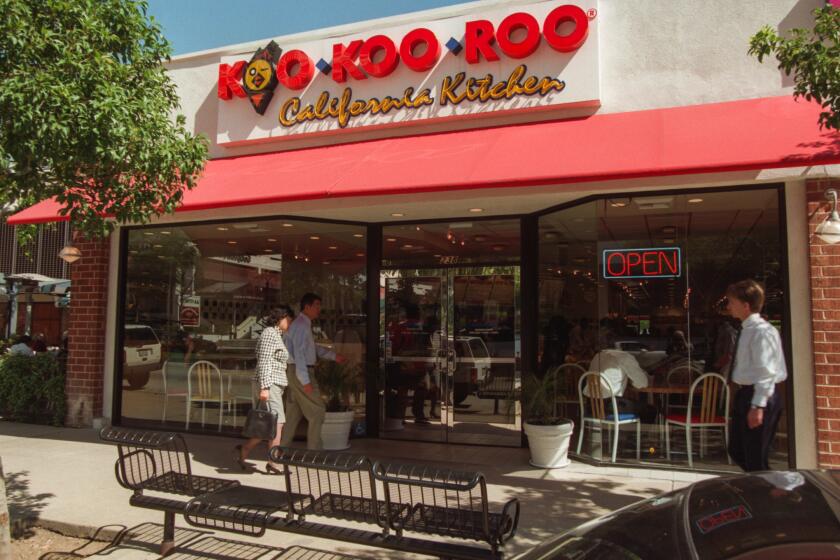The Manufactory, one of L.A.’s biggest restaurant projects in years, closes abruptly after 11 months

After 11 months, one of L.A.’s most ambitious and expensive restaurant projects in years has abruptly closed.
The Manufactory — a 40,000-square-foot mega-complex downtown that included the restaurants Tartine Bianco and Alameda Supper Club; a marketplace selling baked goods and prepared foods; a takeout window for coffee and ice cream; and a coffee roastery — closed all but its wholesale bakery operations Monday, according to co-owner Chad Robertson.
“I’ve agonized over it for months,” he said. “But it’s just a responsible business decision because it’s been a challenge to pay our staff and purveyors. It was losing money,” he said of the restaurants, “and other things were making money — and that’s a no-brainer; that’s Business 101.”
There were signs of trouble almost from the start at the Manufactory, a collaboration between Robertson and Elisabeth Prueitt of Tartine Bakery in San Francisco and Chris Bianco of Pizzeria Bianco in Phoenix. It opened in January after a two-year-long buildout and was the flagship of the Row DTLA complex, itself a sprawling hub of restaurants, stores and offices on Alameda Street.
I’ve agonized over it for months. But it’s just a responsible business decision.
— Chad Robertson, co-owner of the Manufactory
Despite considerable hype — diners familiar with the 17-year-old Tartine brand had eagerly awaited the L.A. arrival of the acclaimed bread and pastry maker — the two restaurants were rarely busy. Customers seemed confused by the unwieldy nature of the Manufactory, with its multiple and sometimes overlapping concepts that were hard to distinguish from one another, or turned off by its location inside the fortress-like Row.
“It was kind of a shock to me that L.A. doesn’t want to go downtown in the summer,” Robertson said. The Manufactory had been counting on a steady stream of customers during the work week, but several office spaces remain unoccupied at the Row, which sees its largest crowds during the Sunday Smorgasburg market.
At lunchtime on Tuesday, paper signs with “Closed” scrawled in marker were taped to the Manufactory’s takeout window and marketplace; another, affixed to the door of the former Tartine Bianco, said: “We are temporarily closed during this exciting transformation.” Inside the cavernous space, the hefty loaves of bread that lined the walls were gone; the grab-and-go cold cases emptied of salads and cheeses; the shelves bare of pantry staples.
“This used to be a restaurant,” one passerby said to a group of friends as they stopped to peer through the windows.
A few doors down, the wholesale bakery was still thrumming with activity, although remaining staff said they were stunned by the sudden turn of events.
“It was shocking and hard to process,” said a baker who was taking her lunch break at a cluster of lawn chairs outside. For the last several weeks, she said, “it felt like there was something going on behind the scenes.”
The worker, who declined to give her name, said she’d been making pastries at the Manufactory since March and had noticed low turnout for the restaurants and for the Row in general.
“This location isn’t conducive to foot traffic,” she said. “It’s not a neighborhood. It’s a destination place.”
I can only say that I will have a Pizzeria Bianco in Los Angeles. That’s personal to me. Is Chris Bianco leaving town? No way.
— Chef Chris Bianco
Tartine Bianco quietly ended dinner service in September before closing for good last month; at the time, Bianco said he would turn the restaurant into the first Los Angeles location of his famed pizzeria.
When reached by phone Monday night, the chef said: “I’ve been better. It’s been a long day.”
Bianco said he still planned to open his pizzeria but was uncertain if it would go into the Manufactory space or a different location within the Row.
“I can only say that I will have a Pizzeria Bianco in Los Angeles. That’s personal to me,” he said. “Is Chris Bianco leaving town? No way.”

Robertson said Tartine still occupies 13,000 square feet of space downtown, “so even after closing the parts we did today, we are still the biggest tenant at the Row.” He said he and other partners were working together to find new tenants to fill out the rest of the Manufactory space and alluded to interest from high-profile chefs.
“There are some things we’re talking about that could happen that would make me think all this brain damage was worth it,” Robertson said. “I’m optimistic to a fault, obviously, but I still believe in it.”
On Tuesday, a Row spokeswoman said that “the closure of the Manufactory restaurants and market is unfortunate” but noted that property owners were supportive of Tartine’s decision “to focus on their core business of making bread and pastries.”
The Row sits in a sprawling 32-acre historic complex that was one of the most ambitious private developments of early 20th century Los Angeles, connecting the city’s port to downtown by rail. When it opened in the World War I era as Union Terminal Annex, it was the second-largest wholesale terminal in the world.
More than 100 wholesale and manufacturing firms conducted their entire businesses there, and giants such as B.F. Goodrich Rubber Co. and Owl Drug Co. had large-scale operations on-site. It once held a bank, hotel, barbershop and restaurants; until a few years ago, it was home to the headquarters of now-defunct clothing firm American Apparel. The vast majority of produce business for the region was conducted there and it remains a major regional hub for fruit and vegetable distribution.
Current owners Atlas Capital Group and Square Mile Capital Management have invested millions of dollars into turning the Row’s six main buildings into offices for rent to tenants in creative fields. The idea is for the property’s upscale shops and restaurants — there are currently more than 40, including tiny kaiseki spot Hayato, trendy streetwear store Bodega and Japanese bicycle maker tokyobike — to serve occupants and draw visitors.
Development of the Row complex is ongoing but is intended to have 1.3 million square feet of offices and more than 100 stores upon completion years from now, according to real estate data provider CoStar.
For now, the warren of industrial buildings can sometimes feel like a ghost town.
“Generally speaking people don’t go during the week,” Robertson said. “We built an amazing space, but L.A. didn’t come to the Eastside in the time we needed them to.”
Bianco, who was at the Manufactory on Tuesday to talk to staff, sees potential. He praised the complex’s back-lot vibe and called it “a magical space.”
“I wish the project had been better articulated,” he said over coffee at Go Get Em Tiger at the Row. What’s next, he said, will have “more clarity and purpose.”
Tartine was founded in the Mission District of San Francisco in 2002, with Robertson baking bread in a wood-fired brick oven and Prueitt crafting pastries. It gained a devoted following and is widely considered one of the best and most influential bakeries in the world.
The brand is in the midst of an aggressive expansion: A Tartine Silver Lake and Tartine Santa Monica “will be open in the next 60 days,” Robertson said. Dan Rabilwongse, who has worked at Hayato, Bouchon and Tsubaki, will be the chef at the Silver Lake outpost.
Tartine Sycamore, a casual daytime-only restaurant, remains open in Hollywood. The company’s five locations in the Bay Area and four in Seoul are unaffected.
Tartine breads and other baked goods will continue to be available at Whole Foods markets in downtown, West Hollywood, Glendale and Burbank.

Some Manufactory workers appeared to have been caught off guard by the decision on Monday.
“One week before Christmas, @tartinebakery at the Manufactory decided to let its entire staff go when they showed up for work today. Lest you think cold-hearted misers only appear in Dickens’ novels,” tweeted Ana Maria Montoya. When reached by phone, she said her boyfriend had worked in the marketplace as a retail employee since its first day and was laid off during a midmorning staff meeting.
Robertson said that the layoffs were particularly difficult and that he’s trying to move some workers to other positions at the company.
“I had a great team and I lost all of them. It’s not because anybody did anything wrong,” he said. “We just miscalculated with the timing of the restaurants.”
Times staff writer Roger Vincent contributed to this report.
More to Read
Eat your way across L.A.
Get our weekly Tasting Notes newsletter for reviews, news and more.
You may occasionally receive promotional content from the Los Angeles Times.











